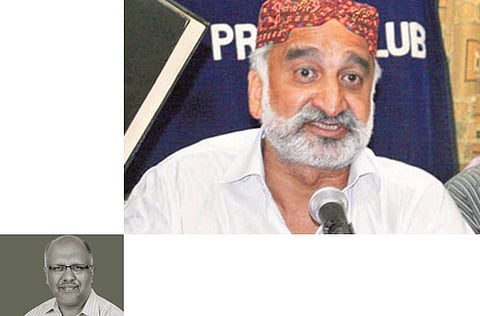Mirza factor comes into play
Sindh politician's outburst could help initiate a new tradition of truth in Pakistani politics

Even by the standards of Pakistan's typically colourful but turbulent politics, events of the past week stood out as a clear exception.
Zulfiqar Mirza, a well-known politician from the southern Sindh province, previously known for his closeness to President Asif Ali Zardari, publicly launched a significant political offensive targeting not just a key government minister who has built close ties with Zardari. Mirza also chose to publicly denounce the Karachi- based Muttahida Qaumi Movement (MQM) — a key political party, considered at least a half ally of Zardari's Pakistan Peoples Party (PPP).
It is not yet clear exactly how this latest drama in Pakistan's politics will eventually play itself out. For some, the Mirza episode is a powerful reminder of Pakistan's continuing journey towards consolidating its recent but widely cherished democracy where the right to free speech must be a fundamental pillar.
For others, Mirza's friendship with Zardari going back to their childhood may well suggest that the two men remain hand in glove and that Mirza's outburst was part of a well-organised drama to corner the MQM. For months, Zardari's relationship with the MQM, which dominates Karachi, has hovered between being icy cold to just lukewarm. During this time, the MQM has broken ranks with the PPP, only to return later to the fold of the ruling party.
But there is another element in this emerging picture which needs to be carefully examined. It is equally possible that the evolution of Pakistan's politics may have taken the country to the point where its political players are beginning to feel compelled to respond to the public's heartbeat.
Across Pakistan, the current ruling order has become the target of popular lament in a country where ordinary citizens feel marginalised, and for very good reason.
While Pakistan's political ruling class, now in power for more than three years since the departure of General Pervez Musharraf, continues to harp on the many gaps surrounding their rule owing to the country's undemocratic past, the number of takers of this line of argument are increasingly few. Today's ruling structure in Pakistan, tainted by allegations of corruption surrounding some of its key leaders, has failed to rise to the occasion.
For most Pakistanis, challenges of daily life ranging from galloping inflation to shortages of electricity and gas, have only fuelled popular complaints against leaders like Zardari and Prime Minister Yousuf Raza Gilani. Instead, there is a rapidly growing yearning for a liberator.
Restoring confidence
In this background, Mirza's outburst, though unpalatable for the rulers, sounds like a long overdue breath of fresh air. Mirza's decision to publicly make comments such as his knowledge of the MQM's role in the widely publicised killing of a Pakistani TV reporter, has brought forward what is indeed a rare example of a bold tradition in Pakistan's politics.
Going forward, it is now up to Mirza to back his claim with continuing his venture by publicly revealing the evidence that he claims to have gathered. This will help to finally begin a new tradition of truthfulness in Pakistani politics.
More vitally, it will also lead to the restoration of the public's confidence in their leaders. Eventually, the final shape of Pakistan's political picture as a result of what has popularly been dubbed the ‘Mirza factor' is yet to become fully obvious. But what is equally vital for the long haul, irrespective of the fate of the present day rulers, is the arrival of a new tradition and a new way of conducting politics. For too long, Pakistanis have lived under the shadow of one set of rulers surpassing their predecessors in matters like corruption and nepotism.
Though difficult to gauge tangibly, the loss of public confidence in their leaders has harmed Pakistan's interests in a colossal way. The mere fact that most of Pakistan's qualified professionals today prefer to head out of the country rather than stay at home speaks volumes not only about a continuing brain-drain but also the widespread disgust over the way the country is being run.
While rulers like Zardari and Gilani have failed to arrest the continuing loss of popular confidence, Mirza, to his credit, has demonstrated that there are still individuals in places of high power who speak the truth.
Farhan Bokhari is a Pakistan-based commentator who writes on political and economic matters.

